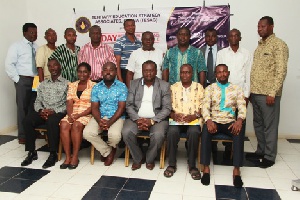Regional News of Thursday, 13 March 2014
Source: TESAG
TESAG holds training programme
Tertiary Education Strategy Associates, Ghana (TESAG) a private consultancy in education held its maiden training programme on Quality Assurance for tertiary institutions in Ghana. Participants were mainly rectors, vice-rectors, registrars, finance and Quality Assurance Officers drawn from some public /private universities and polytechnics across the country.
The two-day residential training programme was themed “Achieving Quality Assurance through Regulations and Governance” and was held at the African Royal Beach Hotel, Nungua on March 5 and 6, 2014. In his open address, the Executive Fellow of TESAG, Mr. Rudolf Amo-Asare stressed the vital contribution of tertiary institutions and education to the socio-economic growth of the country and the need to equip the leadership of tertiary institutions with relevant and dynamic skills and knowledge in order to churn out the right and employable workforce for the country. He reiterated the need for continuous public-private collaboration in the education sector.
Speaking on the role of Central Government in tertiary education in Ghana, Mr. Cephas Adjei Mensah, a Deputy Director (Tertiary), Ministry of Education, took participants through the functions of government through its agencies such as Ministry of Education, National Council for Tertiary Education (NCTE), National Accreditation Board, NABPTEX, COTVET among others. These include monitoring, regulating, funding among other functions.
Speaking on managing and financing tertiary institutions, Head of Planning, Innovation and Research at the NCTE, Dr. Emmanuel Newman admonished institutions especially public institutions to look at other sources of income apart from relying on Government subventions. He advised institutions to set up funding units that can put out proposals to fund organizations.
On the proposed upgrading of Polytechnics to Technical Universities, participants lauded the intended initiative as this will encourage students to pursue technical related courses and be able to feed the industries. They however advised government to involve representatives from the polytechnics in any feasibility studies to be done in carrying out the initiative.
Participants bemoaned the poor interest and performance of students in Mathematics and Science at the basic levels and therefore advised teachers to device innovative ways of handling these subjects in order to whip up interest in these subjects. This, they believe will raise a crop of Mathematics teachers across various levels of education. On government subventions, participants expressed worry on its delay to the institutions and advised government not to hastily wean institutions from the subvention.
Participants expressed appreciation to the organizers of the programme and looked forward to similar initiatives.











